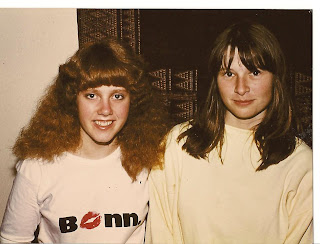
Its story time!
Once upon a time there was a young man who loved cars. He worked and he saved and one day he was able to buy the sport car of his dreams. (Here you may insert in your mental film of this story your dream car.) He decided to take his precious new acquisition out for a drive on a winding country road. He came up over a rise and saw a boy up ahead standing by the road. The boy say him and waved. The man, thinking of how delighted he would have been at that age to see such a beautiful car drive by, slows,so the boy can better enjoy the view, and waves back as he goes by. As he passes the boy stoops down, grabs a rock, and hurls it at the car. The rock hits.
OK, freeze frame, stop film, and consider:
What do you think of the boy? What would you think or do if you were in the young man's position? (I haven't met anyone, including myself that didn't first assume the boy's motives were at least somewhat delinquent. If you are the first I would love to hear about it.)
OK, resume film.
The man was rightly shocked, which was quickly followed by anger and a determination that the boy would not get away with this. He stopped, put the car in reverse and quickly backed up. He was so busy running through the scathing correction he would give, and how the boy would pay for what he had done, that he didn't find it odd that the boy didn't run away. As soon as he was next to the boy, he put down his window and prepared to let the boy have it. He had no time, for as soon as the window cracked the boy began to thank him and tell him that he had a friend seriously injured in a nearby field, and he needed to get help and how sorry he was for throwing the rock, but he didn't know how else to get the car to stop and would he please help.
OK, end story number one.
Has your estimation of the boy and his motives changed? Why did you make the assumptions you first did? How come your first thought was not that this was a good boy trying to save his friend's life?
I first heard that story in a leadership training meeting. It stuck with me because I realized I often make the same kind of erroneous assumptions about others in my life. There is a saying that you shouldn't judge a person until you have walked a mile in his shoes. It would be a wonderful thing if we could actually do that, but then we wouldn't have time to live our own unique lives, would we? In the above story, the young man did kindly attempt to put himself in the boy's shoes. From the moment the man saw the boy he thought of his own experiences and desires, and assumed the boy was standing there staring and waving for the same reason he would have- in admiration of the car. Following the same train of reasoning, when the boy threw the rock, the young man assumed it was based on jealously or malice, because that is the only reason he could come up with as to why he would've thrown a rock if he had been in the boys place. But he was not the boy and he was very, very wrong about what was in the boys heart.
Which brings me back to the power of knowing the love of God. God loves each of us perfectly, and he is able to see and understand each of us more deeply than we can understand each other without his help. As he tells us in 1 Samuel 16:7 "
for the Lord seeth not as man seeth; for man lookeeth on the outward appearance, but the Lord looketh on the heart." One of the remarkable promises the Lord gives us is the promise that if we choose to become his followers he will share the gift of his love and perspective with us, so that it becomes a defining characteristic of our being. In Moroni 7:48 we are taught "
Pray unto the Father with all the energy of heart, that ye may be filled with this love, which he hath bestowed upon all who are true follower of his Son, Jesus Christ." And one of the components of charity we are taught, is that it rejoices in truth. (1 Corinthians 13:6, Moroni 7:45) And truth we are taught is "
things as they reallly are." (Jacob 4:13, Doctrine & Covenants 93:24). And, since it is story time, there is one particular story that brought this all together for me. I am so grateful Elder Groberg chose to share his experience. Though I've never had the dramatic experience he had, I delighted in recognizing that what had happened for him was happening for me- the same type change in how I saw the world and others- and the same struggle, at times to hang on to it. When I have one of those days when the the love of God feels light years away- you know the days you feel you could cheerfully cause great damage to various persons, and most often their cars- I find this story time helps me remember the most important thing I know.
Elder Groberg:
God is anxious to help us feel His love wherever we are. Let me give an example.
As a young missionary I was assigned to a small island of about 700 inhabitants in a remote area of the South Pacific. To me the heat was oppressive, the mosquitoes were terrible, the mud was everywhere, the language was impossible, and the food was—well, “different.”
After a few months our island was struck by a powerful hurricane. The devastation was massive. Crops were ruined, lives were lost, housing was blown away, and the telegraph station—our only link to the outside world—was destroyed. A small government boat normally came every month or two, so we rationed our food to last four or five weeks, hoping the boat would come. But no boat came. Every day we became weaker. There were acts of great kindness, but as the sixth and seventh weeks passed with very little food, our strength slipped noticeably. My native companion, Feki, helped me in every way he could, but as the eighth week commenced, I had no energy. I just sat under the shade of a tree and prayed and read scriptures and spent hours and hours pondering the things of eternity.
The ninth week began with little outward change. However, there was a great inward change. I felt the Lord’s love more deeply than ever before and learned firsthand that His love “is the most desirable above all things … yea, and the most joyous to the soul” (1 Ne. 11:22–23).
I was pretty much skin and bones by now. I remember watching, with deep reverence, my heart beating, my lungs breathing, and thinking what a marvelous body God has created to house our equally marvelous spirit! The thought of a permanent union of these two elements, made possible through the Savior’s love, atoning sacrifice, and Resurrection, was so inspiring and satisfying that any physical discomfort faded into oblivion.
When we understand who God is, who we are, how He loves us, and what His plan is for us, fear evaporates. When we get the tiniest glimpse of these truths, our concern over worldly things vanishes. To think we actually fall for Satan’s lies that power, fame, or wealth is important is truly laughable—or would be were it not so sad.
I learned that just as rockets must overcome the pull of gravity to roar into space, so we must overcome the pull of the world to soar into the eternal realms of understanding and love. I realized my mortal life might end there, but there was no panic. I knew life would continue, and whether here or there didn’t really matter. What did matter was how much love I had in my heart. I knew I needed more! I knew that our joy now and forever is inextricably tied to our capacity to love.
As these thoughts filled and lifted my soul, I gradually became aware of some excited voices. My companion Feki’s eyes were dancing as he said, “Kolipoki, a boat has arrived, and it is full of food. We are saved! Aren’t you excited?” I wasn’t sure, but since the boat had come, that must be God’s answer, so yes, I was happy. Feki gave me some food and said, “Here, eat.” I hesitated. I looked at the food. I looked at Feki. I looked into the sky and closed my eyes.
I felt something very deep. I was grateful my life here would go on as before; still, there was a wistful feeling—a subtle sense of postponement, as when darkness closes the brilliant colors of a perfect sunset and you realize you must wait for another evening to again enjoy such beauty.
I wasn’t sure I wanted to open my eyes, but when I did I realized that God’s love had changed everything. The heat, the mud, the mosquitoes, the people, the language, the food were no longer challenges. Those who had tried to harm me were no longer my enemies. Everyone was my brother or sister. Being filled with God’s love is the most joyous of all things and is worth every cost.
I thanked God for this choice time and for the many reminders of His love—the sun, the moon, the stars, the earth, the birth of a child, the smile of a friend. I thanked Him for scriptures, for the privilege of prayer, and for that most marvelous reminder of His love—the sacrament.
I learned that as we sing the sacrament hymns with real intent, phrases like “How great the wisdom and the love” or “Dearly, dearly has he loved! And we must love him too” will swell our hearts with love and gratitude (see “How Great the Wisdom and the Love,” Hymns, no. 195; “There Is a Green Hill Far Away,” Hymns, no. 194). As we sincerely listen to the sacrament prayers, phrases such as “always remember him,” “keep his commandments,” “have his Spirit to be with them” will fill our hearts with an overwhelming desire to be better (see D&C 20:77, 79). Then when we partake of the bread and the water with a broken heart and a contrite spirit, I know we can feel and even hear those most wondrous words “I love you. I love you.”
I thought I would never forget these feelings, but the pull of the world is strong and we tend to slip. But God continues to love us. (John H. Groberg, “The Power of God’s Love,” Ensign, Nov 2004, 9)
 This visual, which I was given several years ago as a teaching aid, seems to capture my experience. What is happening in this picture? Is there a victim? At first glance, the essence of what is happening seems pretty obvious. One young man is assaulting another. Imagine yourself on a jury to which this picture is presented by the "victim" as evidence of the assault. How do you find?
This visual, which I was given several years ago as a teaching aid, seems to capture my experience. What is happening in this picture? Is there a victim? At first glance, the essence of what is happening seems pretty obvious. One young man is assaulting another. Imagine yourself on a jury to which this picture is presented by the "victim" as evidence of the assault. How do you find? 








